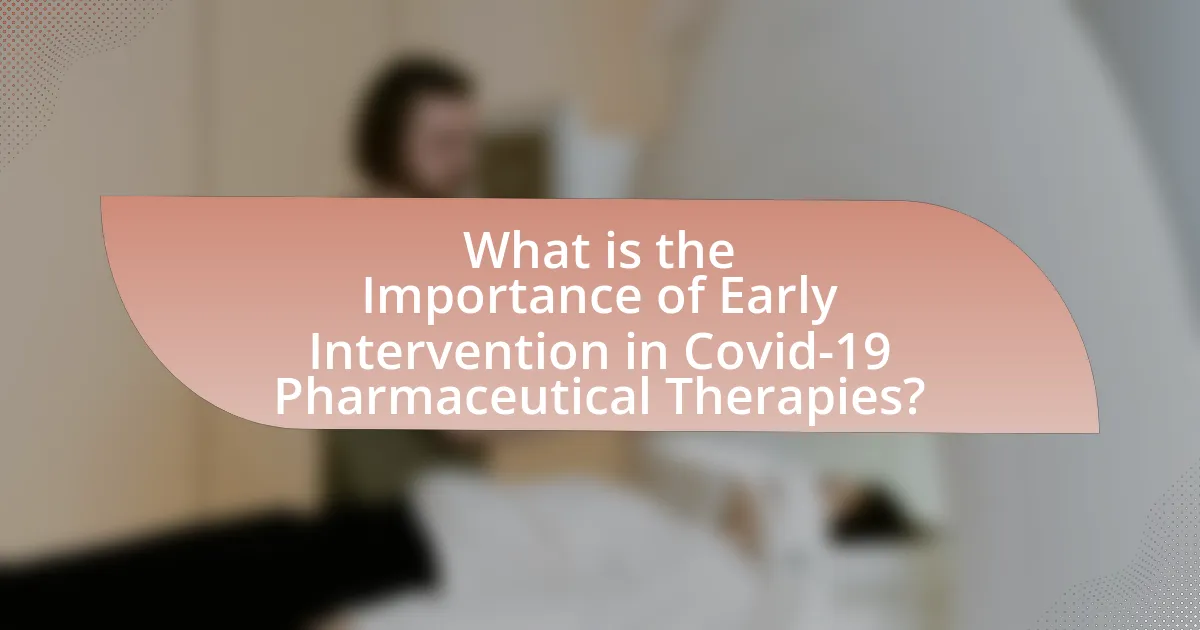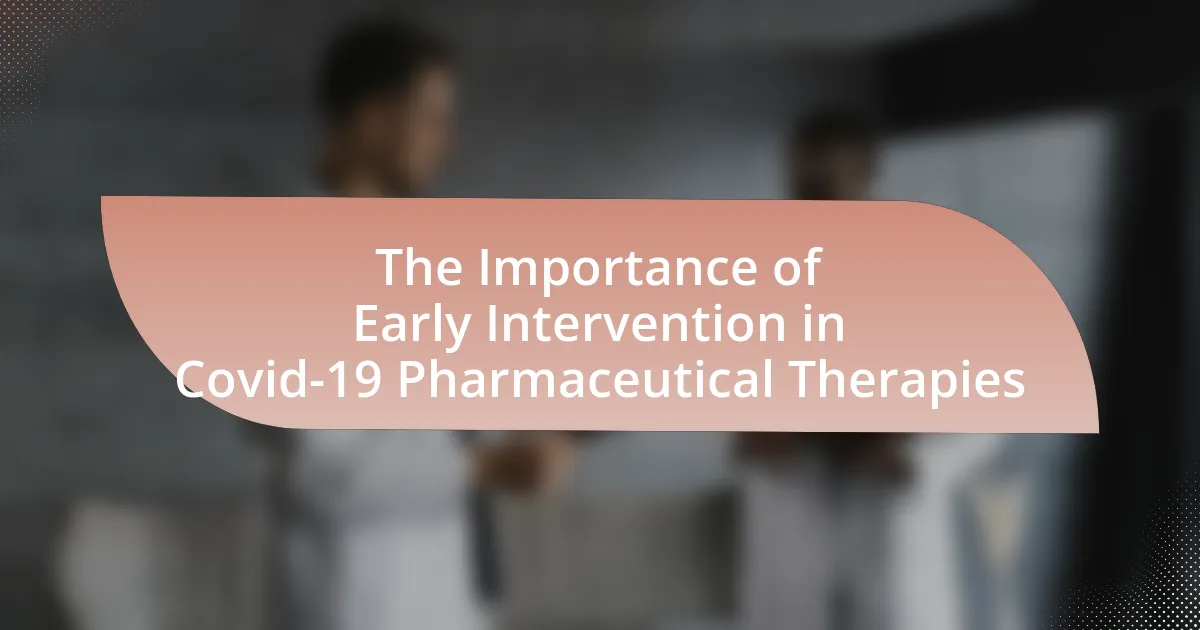The article emphasizes the critical role of early intervention in COVID-19 pharmaceutical therapies, highlighting how timely administration of antiviral treatments, such as remdesivir and Paxlovid, can significantly reduce disease severity, hospitalization rates, and mortality. Evidence from clinical trials demonstrates that early treatment leads to faster recovery and mitigates the burden on healthcare systems. The article also discusses the challenges in promoting early intervention, including public awareness, access to healthcare, and misinformation, while outlining best practices and the importance of patient education and telemedicine in enhancing early treatment outcomes.

What is the Importance of Early Intervention in Covid-19 Pharmaceutical Therapies?
Early intervention in COVID-19 pharmaceutical therapies is crucial as it significantly reduces the severity of the disease and improves patient outcomes. Studies have shown that administering antiviral treatments, such as remdesivir, within the first few days of symptom onset can decrease hospitalization rates and mortality. For instance, a clinical trial published in the New England Journal of Medicine demonstrated that early treatment with remdesivir led to a 31% faster recovery compared to placebo. This highlights that timely intervention not only mitigates the progression of the virus but also alleviates the burden on healthcare systems.
Why is early intervention critical in the context of Covid-19?
Early intervention is critical in the context of Covid-19 because it significantly reduces the severity of the disease and improves patient outcomes. Timely administration of antiviral treatments, such as remdesivir, has been shown to decrease hospitalization rates and shorten recovery times, as evidenced by clinical trials indicating a 31% faster recovery in patients treated early compared to those who received standard care. Additionally, early intervention helps to prevent the progression of the disease to severe stages, thereby reducing the burden on healthcare systems and minimizing the risk of complications, including long Covid.
What are the potential outcomes of delayed intervention in Covid-19 treatments?
Delayed intervention in Covid-19 treatments can lead to increased severity of illness, higher rates of hospitalization, and greater mortality. Studies indicate that timely administration of antiviral therapies, such as remdesivir, significantly reduces the risk of severe disease progression and improves recovery times. For instance, a clinical trial published in the New England Journal of Medicine demonstrated that patients receiving remdesivir within 10 days of symptom onset had a 31% faster recovery compared to those receiving standard care. Additionally, delayed treatment can result in prolonged viral shedding, increasing the risk of transmission to others. Therefore, early intervention is crucial to mitigate these adverse outcomes.
How does early intervention impact patient recovery rates?
Early intervention significantly improves patient recovery rates in COVID-19 cases. Studies indicate that administering antiviral treatments, such as remdesivir, within the first few days of symptom onset can reduce the duration of hospitalization and the need for mechanical ventilation. For instance, a clinical trial published in the New England Journal of Medicine found that patients receiving early treatment with remdesivir had a 31% faster recovery rate compared to those receiving standard care. This evidence underscores the critical role of timely therapeutic interventions in enhancing recovery outcomes for COVID-19 patients.
What role do pharmaceutical therapies play in early intervention?
Pharmaceutical therapies play a critical role in early intervention for COVID-19 by reducing the severity of symptoms and preventing disease progression. Early administration of antiviral medications, such as remdesivir, has been shown to decrease hospitalization rates and improve recovery times, as evidenced by clinical trials demonstrating a significant reduction in viral load and symptom duration. Additionally, monoclonal antibodies, when given promptly after diagnosis, can lower the risk of severe outcomes, supporting the importance of timely therapeutic intervention in managing COVID-19 effectively.
Which pharmaceutical therapies are most effective for early intervention in Covid-19?
The most effective pharmaceutical therapies for early intervention in Covid-19 include antiviral medications such as Paxlovid (nirmatrelvir/ritonavir) and molnupiravir, as well as monoclonal antibodies like sotrovimab and casirivimab/imdevimab. Paxlovid has been shown to reduce the risk of hospitalization and death by 89% when administered within three days of symptom onset, according to a study published in the New England Journal of Medicine. Similarly, monoclonal antibodies have demonstrated efficacy in reducing viral load and preventing severe disease in high-risk patients when given early in the course of infection.
How do these therapies work to mitigate the effects of Covid-19?
Therapies designed to mitigate the effects of Covid-19 primarily work by targeting the virus’s ability to replicate and by modulating the immune response. Antiviral medications, such as remdesivir, inhibit viral replication, thereby reducing the viral load in the body. Additionally, therapies like monoclonal antibodies neutralize the virus, preventing it from entering cells and facilitating a quicker recovery. Corticosteroids, such as dexamethasone, reduce inflammation caused by the immune response, which can lead to severe complications in Covid-19 patients. Clinical studies have shown that early intervention with these therapies significantly decreases hospitalization rates and mortality, highlighting their effectiveness in managing Covid-19.
What evidence supports the need for early intervention in Covid-19 treatments?
Early intervention in Covid-19 treatments is supported by evidence showing that timely administration of antiviral therapies significantly reduces the risk of severe disease and hospitalization. Studies, such as the one published in the New England Journal of Medicine, demonstrate that patients receiving antiviral treatments like remdesivir within the first few days of symptom onset experienced a 31% faster recovery compared to those receiving placebo. Additionally, research from the World Health Organization indicates that early treatment can lower mortality rates, particularly in high-risk populations. These findings underscore the critical role of prompt therapeutic intervention in improving patient outcomes during the Covid-19 pandemic.
What studies highlight the benefits of early pharmaceutical intervention?
Studies that highlight the benefits of early pharmaceutical intervention in COVID-19 include the RECOVERY trial and the TOGETHER trial. The RECOVERY trial, conducted in the UK, demonstrated that early administration of dexamethasone significantly reduced mortality in hospitalized patients requiring oxygen, with a 35% reduction in deaths among those on mechanical ventilation. The TOGETHER trial, conducted in Brazil, found that early treatment with the antiviral drug favipiravir reduced the risk of hospitalization by 30% in high-risk patients. These studies provide concrete evidence that timely pharmaceutical interventions can improve patient outcomes in COVID-19.
How do clinical trials inform our understanding of early intervention effectiveness?
Clinical trials provide critical data on the effectiveness of early interventions by systematically evaluating treatment outcomes in controlled environments. These trials assess various pharmaceutical therapies administered shortly after COVID-19 diagnosis, measuring metrics such as viral load reduction, symptom alleviation, and hospitalization rates. For instance, the RECOVERY trial demonstrated that early administration of dexamethasone significantly reduced mortality in hospitalized patients, highlighting the importance of timely intervention. Such evidence from clinical trials informs healthcare providers and policymakers about the optimal timing and selection of therapies, ultimately guiding clinical practice and improving patient outcomes in the context of COVID-19.
How can healthcare systems implement early intervention strategies?
Healthcare systems can implement early intervention strategies by establishing protocols for rapid identification and treatment of COVID-19 symptoms. This involves training healthcare professionals to recognize early signs of the disease and utilizing telehealth services to facilitate immediate consultations. Evidence from studies indicates that timely administration of antiviral therapies, such as remdesivir, can significantly reduce hospitalization rates and improve patient outcomes. For instance, a clinical trial published in the New England Journal of Medicine demonstrated that early treatment with remdesivir led to a 31% faster recovery compared to placebo. By integrating these practices, healthcare systems can enhance their response to COVID-19 and mitigate its impact on public health.
What protocols should be established for early intervention in Covid-19 cases?
Protocols for early intervention in Covid-19 cases should include immediate testing, isolation of positive cases, and initiation of antiviral treatments. Testing allows for the rapid identification of infected individuals, which is crucial for controlling the spread of the virus. Isolation prevents further transmission, while antiviral treatments, such as remdesivir or monoclonal antibodies, have been shown to reduce the severity of the disease and improve recovery times. Studies indicate that early treatment can significantly decrease hospitalization rates and mortality, underscoring the importance of these protocols in managing Covid-19 effectively.
How can healthcare providers be trained to recognize early symptoms effectively?
Healthcare providers can be trained to recognize early symptoms effectively through structured educational programs that emphasize symptom identification and clinical assessment skills. These programs should include evidence-based guidelines, case studies, and simulation training to enhance practical understanding. Research indicates that training initiatives, such as those developed by the World Health Organization, improve diagnostic accuracy and response times in clinical settings. For instance, a study published in the Journal of Medical Internet Research found that training healthcare workers on COVID-19 symptoms led to a 30% increase in early detection rates. This approach ensures that providers are equipped with the necessary knowledge and skills to identify early symptoms, facilitating timely intervention and improving patient outcomes.
What challenges exist in promoting early intervention for Covid-19 therapies?
Promoting early intervention for Covid-19 therapies faces several challenges, including public awareness, healthcare access, and regulatory hurdles. Public awareness is limited, as many individuals may not recognize early symptoms or the importance of seeking treatment promptly. Healthcare access is another significant barrier, particularly in underserved areas where testing and treatment facilities are scarce, leading to delays in intervention. Additionally, regulatory hurdles can slow the approval and distribution of therapies, impacting timely access for patients. These challenges collectively hinder the effective promotion of early intervention strategies, which are crucial for improving patient outcomes in Covid-19 cases.
What barriers do patients face in accessing early treatment options?
Patients face several barriers in accessing early treatment options for COVID-19, including limited availability of therapies, lack of awareness about treatment options, and logistical challenges such as transportation and healthcare access. Limited availability is evidenced by the fact that certain antiviral medications may not be stocked in all healthcare facilities, leading to delays in treatment. Additionally, many patients are unaware of the early treatment options available, which can result in missed opportunities for timely intervention. Logistical challenges, such as the need for patients to travel long distances to receive treatment or navigate complex healthcare systems, further hinder access. These barriers collectively contribute to delays in receiving critical early interventions that can significantly improve outcomes in COVID-19 cases.
How can misinformation about Covid-19 therapies hinder early intervention?
Misinformation about Covid-19 therapies can significantly hinder early intervention by leading individuals to delay seeking appropriate medical care. When people are misled by false claims regarding the effectiveness or safety of certain treatments, they may choose unproven remedies or avoid seeking professional help altogether. For instance, a study published in the Journal of Medical Internet Research found that misinformation can create confusion and mistrust in health authorities, resulting in lower rates of vaccination and treatment adherence. This delay in intervention can exacerbate the severity of the disease, ultimately leading to worse health outcomes and increased strain on healthcare systems.
What best practices can enhance early intervention in Covid-19 pharmaceutical therapies?
Best practices that can enhance early intervention in Covid-19 pharmaceutical therapies include timely diagnosis, effective communication of treatment protocols, and the use of evidence-based guidelines. Timely diagnosis allows for the rapid initiation of antiviral treatments, which has been shown to reduce hospitalization rates and improve patient outcomes. Effective communication ensures that healthcare providers are aware of the latest treatment options and can implement them quickly. Evidence-based guidelines, such as those from the World Health Organization and the National Institutes of Health, provide a framework for selecting appropriate therapies based on the severity of the disease and patient characteristics, thereby optimizing treatment efficacy.
How can patient education improve early intervention outcomes?
Patient education can significantly improve early intervention outcomes by enhancing patients’ understanding of their condition and treatment options. When patients are well-informed, they are more likely to recognize symptoms early, adhere to prescribed therapies, and engage in proactive health behaviors. Research indicates that informed patients can reduce hospitalizations by up to 30% through timely interventions, as they are better equipped to seek medical help when necessary. Furthermore, studies show that patient education initiatives lead to improved medication adherence rates, which is crucial for the effectiveness of pharmaceutical therapies in managing conditions like COVID-19.
What role does telemedicine play in facilitating early intervention?
Telemedicine plays a crucial role in facilitating early intervention by enabling timely access to healthcare professionals for patients exhibiting symptoms of COVID-19. This technology allows for remote consultations, which can lead to quicker diagnosis and treatment initiation, ultimately improving patient outcomes. For instance, a study published in the Journal of Medical Internet Research found that telemedicine consultations significantly reduced the time from symptom onset to treatment initiation, thereby enhancing the effectiveness of pharmaceutical therapies for COVID-19. By bridging geographical barriers and minimizing the risk of virus transmission, telemedicine ensures that patients receive prompt medical attention, which is essential for effective early intervention in managing COVID-19.


